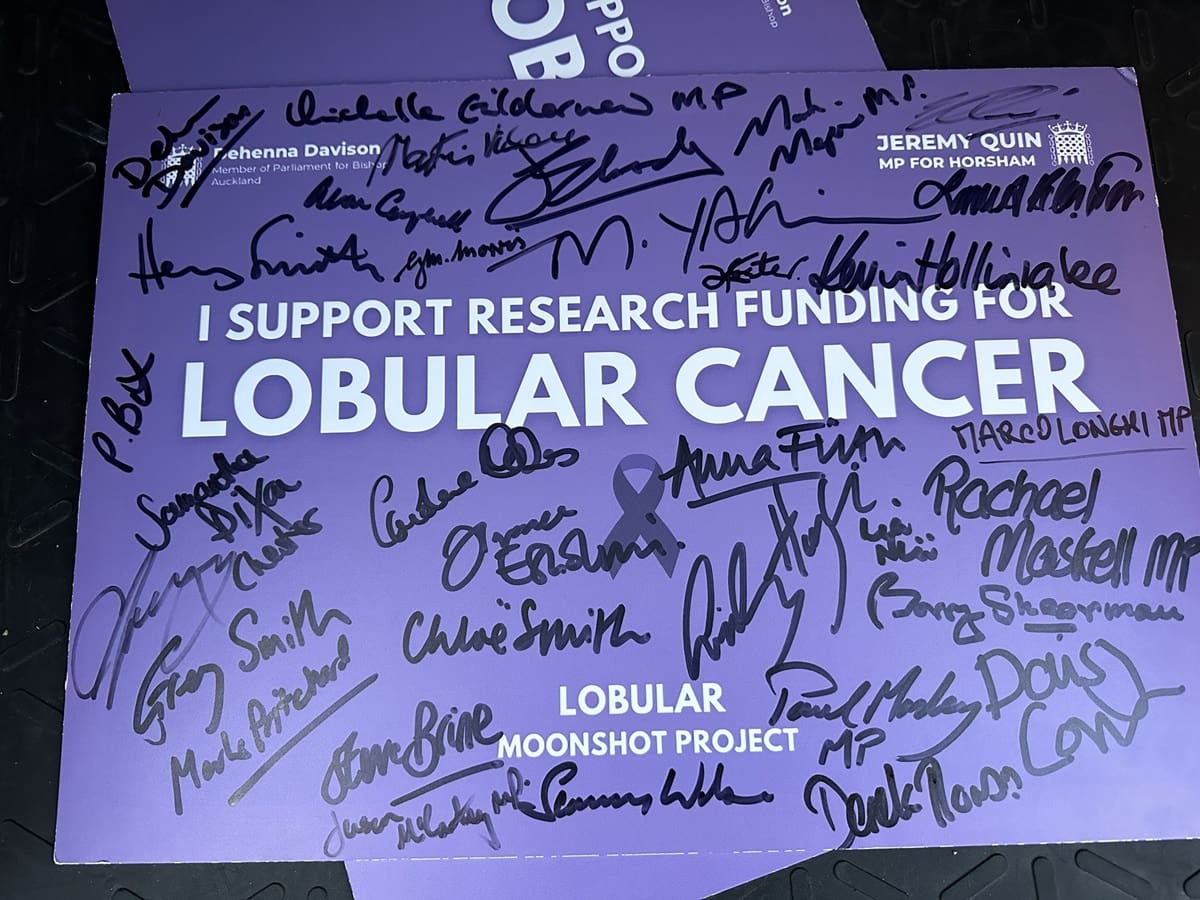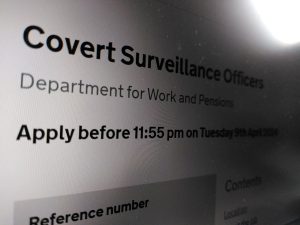More than a third of all MPs (over 220) have rallied together to call on the government to fund a £20m, five-year research project into the second most common form of breast cancer – lobular breast cancer.
Lobular breast cancer: a survivor takes action
The proposed research project would take place at the Institute of Cancer Research in London and is called the Lobular Moon Shot Project. The overall goal is to get funding to enable research to be undertaken to develop ‘specific’ treatments for invasive lobular breast cancer, and raise awareness.
This latest and united front from MPs is a result of months of campaigning by the Lobular Moon Shot Project, headed up by Dr Susan Michaelis, who herself has stage 4 incurable lobular breast cancer.
She said:
I was diagnosed with this type of breast cancer in 2013 and of course had never heard of it. Nobody is aware of it almost.
After a double mastectomy and radiotherapy, I was put on further treatment. However, I quickly learnt that my breast cancer, invasive lobular breast cancer (ILC) had not been seen on years of mammogram and ultrasound screening and surgery showed that it was identified at a more advanced stage – 7cm of ILC.
I soon learnt that it is typical for lobular as it generally does not form an obvious lump like the main type of breast cancer does. This is because the cancer cells form single file, like a spider’s web and are therefore difficult to see on imaging. Additionally, I learnt that lobular does not have its own ’specific’ treatment.
It has been mostly ignored by the research and funding, yet it has been known since the mid 70’s to behave very differently to the main type of breast cancer. Lobular is not a rare cancer; it is diagnosed in 8500 people annually in the UK. It is more common than many other types of cancer which have had a greater research focus.
I have had 2 recurrences, with the 2nd one in 2021 showing that the lobular cancer cells had metastasised to my bones in my spine, pelvis and now my skin and around my eyes.
There is no cure for me.
I feel very let down as I realise lobular is not afforded early diagnosis; I was not given treatments based on science ‘specific’ to lobular breast cancer, as it does not exist and until recently been forgotten. Since I was first diagnosed, another 120,000+ people in the UK have also been diagnosed with lobular breast cancer.
A milestone already reached
Despite being the 2nd most common form of breast cancer, lobular breast cancer still lacks a specific treatment, and in the research field it is often described as the ‘forgotten cancer’. So, Dr Michaelis and her husband set up the Lobular Moon Shot Project (LMSP) in 2023. A year on, it is supported by so many people, many with lobular who, like Dr Michaelis, want solutions.
Many supporters have been diagnosed with ILC and their friends and families have joined the initiative. They too realise the need for change. The funding we require is £20,000,000 over 5 years, to enable the Institute of Cancer Research (ICR, London) to undertake this research for us.
Dr Michaelis said:
This is a big milestone for us and for those everywhere diagnosed with lobular. One thousand people globally are diagnosed everyday, and generally at a later stage because lobular is frequently missed on mammograms, especially with denser breasts.
Even though researchers already acknowledge that lobular (breast cancer) behaves differently to ductal breast cancer, to really understand the distinct biology of lobular, and to provide targeted therapies, there needs to be an intensive research project and that’s what we are proposing. To have the backing of more than 220 MPs demonstrates the seriousness and urgency of the issue.
Research can resolve this
Dehanna Davison MP and Sir Jeremy Quin MP, the first 2 MPs to support the Lobular Moon Shot Project in 2023 stated:
With over 220 MPs now backing the pledge to see funding for vital research, there has never been a more crucial time to ensure that those with lobular cancer get the early diagnosis and effective treatment needed to save their lives.
With funding, the Institute of Cancer Research (ICR) could help resolve this.
In the words of their top scientist in the documentary film “My Journey with Lobular” (available on our website), Professor Chris Lord of ICR stated: “When the scientific community needed it to move extremely fast with the development of Covid vaccines, in the clinical trials, we moved incredibly fast.
We need to have that similar kind of approach in terms of philosophy around lobular breast cancer” and “All of those things are achievable, they’re just a matter of getting the money and doing the work. I’m quietly confident that we can get there, but I know what those barriers are in place. This is not an insignificant challenge, but it is fundamentally a financial challenge.
Specific treatments urgently needed for lobular breast cancer
The overall goal is to get funding to enable research to be undertaken to develop ‘specific’ treatments for ILC awareness. So far, the Lobular Moon Shot Project has hit various milestones. These include:
- Raising over £75,000 so far by community fundraising for the Institute of Cancer Research in London.
- Over 200 MPs from every political party in the UK pledging support to the campaign.
- Meetings with government ministers, including the health secretary who has since added lobular breast cancer to her women’s health strategy priorities 2024.
- Making the first ever feature length documentary about the disease, a one-hour documentary called ‘My Journey With Lobular’ and a short film called ‘Eve Groves’.
Dr Michaelis summed up by saying:
It is very hard to hear the constant barrage of calls for early cancer diagnosis when this does not work for us with lobular; it is even harder knowing that we are not provided with treatments specific for this type of breast cancer.
You can find out more and get involved here.
Featured image via Lobular Moon Shot Project




